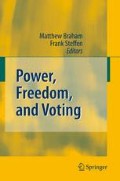Abstract
An impressive list of economists, political scientists, and philosophers starting with Thomas Hobbes and including Herbert Simon (1957), James March (1955), Robert Dahl (1957, 1968), Felix Oppenheim (1961, 1976, 1981), William Riker (1964), Virginia Held (1972), and Jack Nagel (1975) have claimed that there are key and compelling similarities between what is ordinarily considered to be an ascription of social power and that which is considered under the more general rubric of causality. Hence to say:
-
‘i has (had) power to x’, is to assert that i can (did) cause an outcome x.
-
‘i has (had) power over j’ , is to assert that i can (did) cause j to act in a specific way (in a manner that he would not otherwise do).
Access this chapter
Tax calculation will be finalised at checkout
Purchases are for personal use only
Preview
Unable to display preview. Download preview PDF.
References
Barry, B. (1976) Power: An Economic Analysis, in B. Barry (ed.) Power and Political Theory: Some European Perspectives, John Wiley, 69–101.
Braham, M. (2005) Causation and the Measurement of Power, Homo Oeconomicus 22: 645–52.
Braham, M. and Holler, M.J. (2005) The Impossibility of a Preference-based Power Index, Journal of Theoretical Politics 17: 137–158.
Braham, M. and Holler, M.J. (2008) Distributing Causal Responsibility in Collectivities, in T. Boylan and R. Gekker (eds) Economics, Rational Choice, and Normative Philosophy, Routledge.
Connolly, W.E. (1983) The Terms of Political Discourse. Martin Robinson.
Dahl, R.A. (1957) The Concept of Power, Behavioral Science 2: 201–215.
Dahl, R.A. (1963) Modern Political Analysis, Prentice Hall.
Dahl, R.A. (1968) Power, in D.L. Sills (ed.) International Encyclopedia of the Social Sciences, Macmillan, 405–415.
Dowding, K. (2003) Resources, Power, and Systematic Luck: A Response to Barry, Politics, Philosophy and Economics 2: 305–22.
French, P.A. (1984) Collective and Corporate Responsibility, Columbia University Press.
Gerth, H.H. and Mills, C.W. (eds) (1948) From Max Weber: Essays in Sociology, Routledge.
Goldman, A.I. (1972) Toward a Theory of Social Power, Philosophical Studies 23: 221–268.
Goldman, A.I. (1974) On the Measurement of Power, Journal of Philosophy 71: 231–252.
Hart, H.L.A. and Honoré, A.M. (1959) Causation in the Law, Oxford University Press.
Held, V. (1972) Coercion and Coercive Offers, in J.R. Pennock and J.W. Chapman (eds) Coercion, Aldine Atherton.
Hobbes, T. (1651) Leviathan, Oxford University Press.
Holler, M.J. (2007) Freedom of Choice, Power, and the Responsibility of Decision Makers, in A. Marciano and J.-M. Josselin (eds) Democracy, Freedom and Coercion: A Law and Economics Approach, Eward Elgar, 22–42.
Honoré, A.M. (1995) Necessary and Sufficient Conditions in Tort Law, in D. Owen (ed.) Philosophical Foundations of Tort Law, Oxford University Press, 363–385.
Kernohan, A. (1989) Social Power and Human Agency, Journal of Philosophy 86: 712–726.
Kramer, M.H. (2003) The Quality of Freedom, Oxford University Press.
Lukes, S. (ed.) (1986) Power, Basil Blackwell.
Mackie, J.L. (1965) Causes and Conditions, American Philosophical Quarterly 2: 245–264.
Mackie, J.L. (1974) The Cement of the Universe, Oxford University Press.
March, J.G. (1955) An Introduction to the Theory and Measurement of Power, American Political Science Review 49: 431–451.
Morriss, P. (1987/2002) Power: A Philosophical Analysis, Manchester University Press.
Nagel, J. (1975) The Descriptive Analysis of Power, Yale University Press.
Oppenheim, F.E. (1960) Degrees of Power and Freedom, American Political Science Review 54: 437–446.
Oppenheim, F.E. (1961) Dimensions of Freedom, St. Martins Press.
Oppenheim, F.E. (1976) Power and Causation, in B. Barry (ed.) Power and Political Theory: Some European Perspectives, John Wiley, 103–116.
Oppenheim, F.E. (1981) Political Concepts: A Reconstruction, University of Chicago Press.
Parfit, D. (1984) Reasons and Persons, Oxford University Press.
Pearl, J. (2000) Causality: Models, Reasoning, Inference. Cambridge University Press.
Riker, W.H. (1964) Some Ambiguities in the Notion of Power, American Political Science Review 58: 341–349.
Russell, B. (1913) On the Notion of Cause, Proceedings of the Aristotelian Society 13: 1–26.
Simon, H.A. (1957) Models of Man, Wiley.
Singer, P. (1972) Famine, Affluence, and Morality, Philosophy and Public Affairs 1:229–243.
Suppes, P. (1970) A Probabalistic Theory of Causality, North Holland.
Vallentyne, P. (2008) Brute Luck and Responsibility, Politics, Philosophy and Economics (forthcoming).
Wright, R. (1985) Causation in Tort Law, California Law Review 73: 1735–1828.
Wright, R. (1988) Causation, Responsibility, Risk, Probability, Naked Statistics, and Proof: Pruning the Bramble Bush by Clarifying the Concepts, Iowa Law Review 73:1001–1077.
Author information
Authors and Affiliations
Editor information
Editors and Affiliations
Rights and permissions
Copyright information
© 2008 Springer-Verlag Berlin Heidelberg
About this chapter
Cite this chapter
Braham, M. (2008). Social Power and Social Causation: Towards a Formal Synthesis. In: Braham, M., Steffen, F. (eds) Power, Freedom, and Voting. Springer, Berlin, Heidelberg. https://doi.org/10.1007/978-3-540-73382-9_1
Download citation
DOI: https://doi.org/10.1007/978-3-540-73382-9_1
Publisher Name: Springer, Berlin, Heidelberg
Print ISBN: 978-3-540-73381-2
Online ISBN: 978-3-540-73382-9
eBook Packages: Business and EconomicsEconomics and Finance (R0)

